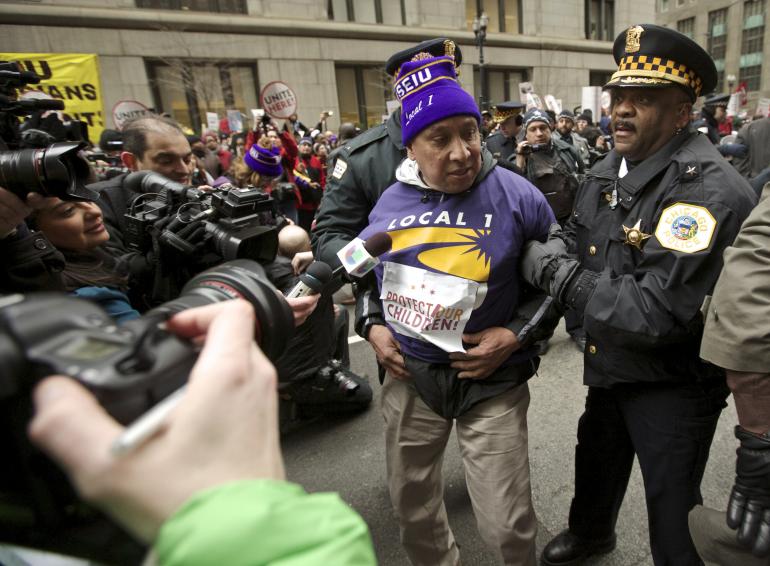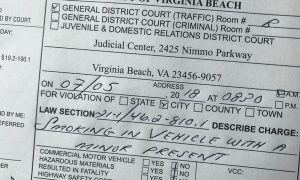A new bill passed last week in Illinois would make it a felony to secretly tape any “private conversations,” with steeper punishments for recording the police. Critics of the proposed law claim it would scare citizens from recording interactions with law enforcement, following a number of high-profile police killings caught on camera,
The bill was passed by both the State House and Senate, and sent to Illinois Governor Pat Quinn on Dec. 4. It would criminalize secretly recording “private conversations” between two or more people, where at least one had a “reasonable expectation” of privacy. However, the proposed law would likely not make it illegal to record police interactions in public. Recordings like those depicting the killings of Michael Brown and Eric Garner would therefore not be affected. The new bill attempts to protect people from surreptitious and improper recording of their conversations without infringing on free-speech rights, its sponsors claim.
“The most important thing the bill does is to restore Illinois to a standard that requires everyone in a private conversation to consent to a recording,” said Democratic Rep. Elaine Nekritz, one of the bill’s sponsors, according to an AP report. “We satisfy the Supreme Court requirement by limiting that to conversations where there is a reasonable expectation of privacy.”
The bill is written around an Illinois Supreme Court ruling in March that struck down an eavesdropping law earlier in the year that would have made it illegal to record conversations without explicit permission from both parties. The court had ruled that the state could not make it illegal to record conversations where there was no “reasonable expectation of privacy,” and said it would “criminalize a wide range of innocent conduct” and violate free-speech rights.
However, the new law does not make a clear distinction between what situations qualify as a private encounter, the Illinois Policy Institute says. The private think tank says that it is “aimed at promoting personal freedom and prosperity,” and that the unclear nature of the bill’s wording make it open to wide interpretation.
“The Illinois Supreme Court said that police don’t have an expectation of privacy in ‘public’ encounters with citizens, but it did not explain what counts as a ‘public’ encounter,” the institute said in a blog post.
The bill is designed to scare citizens from recording police interactions, the institute claims, thanks to steeper punishments for recording police and court officers than private citizens.
It makes “unlawfully recording a conversation with police – or an attorney general, assistant attorney general, state’s attorney, assistant state’s attorney or judge – a class 3 felony, carrying a sentence of two to four years in prison.” Meanwhile, the proposed law would make recording private citizens a class 4 felony, “which carries a lower sentencing range of one to three years in prison.”
The bill must be signed by the governor before it becomes law. The institute claims that the proposed law could also be used as an argument against police body cameras, since it could be argued that recordings outside of “public” places would be illegal, since people in private homes and other areas have not consented to the recording.
Source: International Business Times















































































































































































































































![[Video] Chicago Police Officers Caught On Video Telling Two Black Men "We Kill Mother F**kers"](https://earhustle411.com/wp-content/uploads/2018/07/evil-cop-3-300x180.jpg)
![[Video] Chicago Police Officers Caught On Video Telling Two Black Men "We Kill Mother F**kers"](https://earhustle411.com/wp-content/uploads/2018/07/evil-cop-3-80x80.jpg)












![[Video] White Woman Calls The Cops On Black Real Estate Investor, Cops Threaten To Arrest Her For Harassing Him](https://earhustle411.com/wp-content/uploads/2018/05/nosy-neighbor-300x180.png)
![[Video] White Woman Calls The Cops On Black Real Estate Investor, Cops Threaten To Arrest Her For Harassing Him](https://earhustle411.com/wp-content/uploads/2018/05/nosy-neighbor-80x80.png)


![White Scientist Says The Black Community Is Being Targeted By The Medical System, They Are Deliberatly Being Poisoned [Video]](https://earhustle411.com/wp-content/uploads/2016/05/mike-adams-300x180.jpg)
![White Scientist Says The Black Community Is Being Targeted By The Medical System, They Are Deliberatly Being Poisoned [Video]](https://earhustle411.com/wp-content/uploads/2016/05/mike-adams-80x80.jpg)








![Teenage Girl Shot In Her Stomach Three Times But Took Time To Post To Facebook [ Video]](https://earhustle411.com/wp-content/uploads/2016/02/Gangster-chick-300x180.jpg)
![Teenage Girl Shot In Her Stomach Three Times But Took Time To Post To Facebook [ Video]](https://earhustle411.com/wp-content/uploads/2016/02/Gangster-chick-80x80.jpg)







